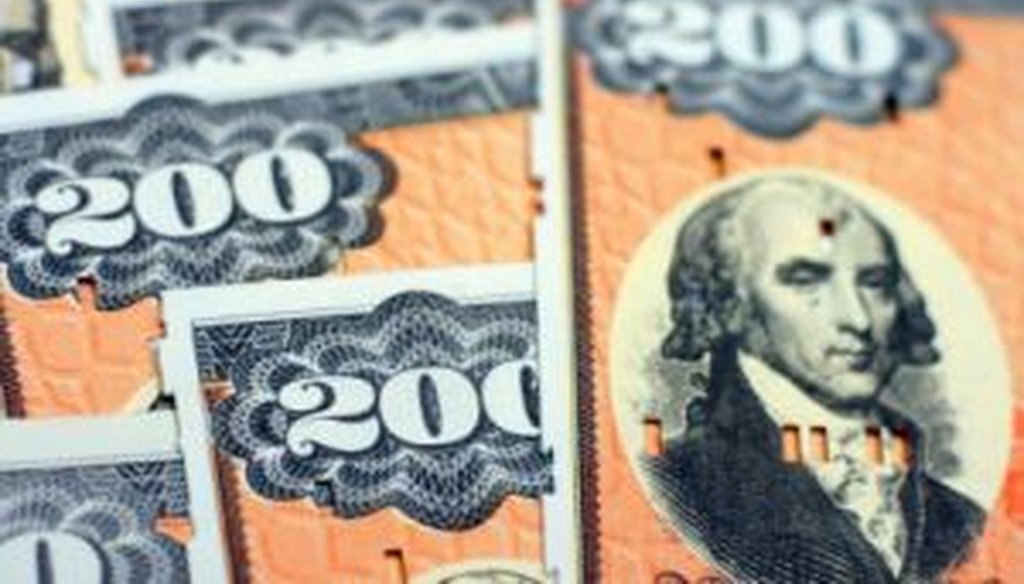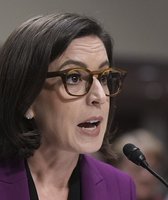Stand up for the facts!
Our only agenda is to publish the truth so you can be an informed participant in democracy.
We need your help.
I would like to contribute

How bad a hit would the United States' creditworthiness take if it defaulted on interest payments to bondholders? What about if it defaulted on other payments? We asked the experts.
During a July 13, 2011, press conference with fellow Republican lawmakers, Rep. Michele Bachmann, R-Minn. -- a leading contender for the Republican presidential nomination -- played down the potential impact of a failure to raise the debt ceiling.
President Barack Obama and Congress are engaged in intense discussions about raising the debt ceiling -- the legal limit on how much money the government can borrow. After hitting the debt ceiling earlier this year, the U.S. Treasury Department juggled accounts to buy time for further negotiations. But officials now expect the debt limit to be reached on Aug. 2, 2011.
Bachmann appeared at a press conference with fellow Republican Reps. Louie Gohmert of Texas and Steve King of Iowa to present a draft bill that would direct the Treasury to prioritize paying interest on the national debt and continue paying members of the military in the event that a deal could not be reached to raise the debt ceiling.
Here’s a portion of what Bachmann said:
"This is a misnomer that I believe that the president and the Treasury Secretary have been trying to pass off on the American people, and it is this -- that if Congress fails to raise the debt ceiling by $2.5 trillion, that somehow the United States will go into default and we will lose the full faith and credit of the United States. That is simply not true.
"It is important to recognize that revenues continue to come in to the United States Treasury. It is merely the president's obligation, and the Congress's, to make sure that the interest is paid on the debt. We are grateful that revenues are sufficient to be able to pay the interest on the debt."
The argument underlying this position is that the government, in the event the debt ceiling is not increased, can choose to prioritize certain payments over certain others. (We investigated whether the government does have the power to do this here.) By prioritizing payments to bondholders, the argument goes, the government would be able to preserve its good credit rating.
But the assumption here is that the markets would be satisfied as long as the interest on bonds was paid, even if doing so meant delaying payments to any number of other creditors to the federal government, from Social Security beneficiaries to federal workers to Pentagon contractors. So we began by asking experts in the field two questions:
First, would the United States "go into default" if the debt ceiling isn’t raised?
And second, would the U.S. lose its "full faith and credit?"
On the first question, our experts largely agreed that -- contrary to Bachmann’s implication -- a failure to pay any of its bills, not just interest to bondholders, would be classified as a default.
Lawrence J. White, an economist at New York University's Stern School of Business, said that "if the federal government delays payment to anyone, then certainly in a common-sense sense, the government has defaulted on its obligations."
Neil H. Buchanan, a George Washington University law professor who specializes in economics, agreed.
"If the government fails to pay any obligation on schedule, that is a default in both the common-sense meaning and in the legal sense," Buchanan said. "The person to whom money is owed has not been repaid. That's a default."
(And if defaults happen, then get ready for the lawyers, said Dean Baker, an economist at the liberal Center for Economic and Policy Research. "Everyone who has a check coming to them under the law has a claim against the government," Baker said. "This means that they can go to court and sue for this money.)
What about the second claim from Bachmann, that the U.S. wouldn’t lose its "full faith and credit" in the event the debt ceiling isn’t raised? We struggled somewhat with Bachmann’s use of the phrase "full faith and credit" -- would she be half right if the U.S. only lost half its faith and credit? -- but in the end we decided that most people would interpret her language to mean that there would be no significant harm to the nation’s creditworthiness.
While several experts we contacted pointed out that market players are not monolithic in their views, we found strong evidence that Bachmann was wrong -- even before two significant news developments on July 14.
"I believe that the financial markets would not be copacetic" if bondholders were repaid but other creditors weren’t, White of NYU said. "They would realize that the government was stiffing one set of claimants who are creditors, and the markets would worry that they might be next."
Buchanan of GWU agreed with White’s point, and added another.
"Foreign holders of Treasuries will understand that it is politically untenable to pay foreigners but not Americans," he said. "Can you imagine the firestorm if Americans were told that we cannot afford to pay Social Security recipients, because we have to pay foreign banks and governments first? The argument that we must do so to protect our credit rating will sound an awful lot like ‘too big to fail’ -- the same argument that said that banks in 2008-09 had to be bailed out, while homeowners and unemployed workers were thrown to the wolves. No matter how strong the argument that doing so is necessary to protect our credit rating, the bottom line is that the government would be favoring foreigners over Americans. Any foreign investor would know that this is not politically sustainable. They would have every reason to dump our bonds, or at least to require much higher rates of return."
Then, after we began researching this item, on July 13 and 14, two developments helped clarify the issue.
Two major ratings agencies -- Moody’s and Standard & Poor’s — publicly announced that they were reassessing whether U.S. Treasury Bonds merited the top possible credit rating. These ratings, issued by agencies that are independent of the government, provide guidance to investors about how secure bond investments are.
In Moody’s case, the company said that it was putting the rating under review due to "the rising possibility" that Obama and lawmakers won’t come to a deal to raise the debt ceiling. "Moody's considers the probability of a default on interest payments to be low but no longer to be" minimal, the agency said in a statement.
Standard & Poor’s sounded a similar note:
"Standard & Poor’s still anticipates that lawmakers will raise the debt ceiling by the end of July, … However, if the government is forced to undergo a sudden, unplanned fiscal contraction -- as a result of Treasury efforts to conserve cash and avoid default absent an agreement to raise the debt ceiling -- we think that the effect on consumer sentiment, market confidence, and, thus, economic growth will likely be detrimental and long-lasting. If the government misses a scheduled debt payment, we believe the effect would be even more significant and, under our criteria, would result in Standard & Poor's lowering the long-term and short-term ratings on the U.S. … until the payment default was cured."
S&P managing director John Chambers used even more stringent language in an interview with the Washington Post. Chambers told the newspaper that even if the parties agreed to raise the debt ceiling, but enacted a less-aggressive deficit-reduction plan as part of the package, it may not be enough to avert a downgrade.
"Chambers said the country must implement a plan to reduce the annual budget deficit by roughly $4 trillion over 10 years, which makes the debt manageable over the long term," the Post reported. "The White House and Congress have discussed a plan that big, but negotiations have more recently centered on a smaller deal, at $2 trillion or less."
In other words, even a breakthrough on the debt ceiling "could still lead to a downgrade" by S&P, Chambers told the Post.
So where does this leave us? Were it not for the unusual timeline of developments, we would likely have rated Bachmann’s claims False. But since the most important piece of evidence — the statements by the ratings agencies — came after Bachmann made her comment, we decided it wasn’t fair to her to rate the statement on the Truth-O-Meter after new evidence emerged.
Our Sources
Michele Bachmann, transcript of press conference, July 13, 2011 (CQ subscribers only)
Standard & Poors, "Research Update: United States of America 'AAA/A-1+' Ratings Placed On CreditWatch Negative On Rising Risk Of Policy Stalemate," July 14, 2011
CNNMoney.com, "Debt ceiling: Moody's puts U.S. on notice," July 13, 2011
Washington Post, "Debt limit: U.S. outreach to banks, investors over possible default comes up empty," July 14, 2011
Washington Post, "S&P warns that chance of downgrading U.S. credit rating is 50 percent," July 14, 2011
John Avlon, "GOP’s Debt Kamikazes" (Newsweek/Daily Beast column), July 15, 2011
Wall Street Journal, "Plan B Emerges on Debt," July 15, 2011
Michele Bachmann, "Bachmann Declares Support for Congressman King’s PROMISES Act" (news release), July 13, 2011
PolitiFact, "Barack Obama said Social Security and other federal checks may not go out on Aug. 3 if the debt ceiling is not increased," July 13, 2011
E-mail interview with Satya Thallam, director of the Financial Markets Working Group at George Mason University's Mercatus Center, July 14, 2011
E-mail interview with Daniel Mitchell, senior fellow at the Cato Institute, July 15, 2011
E-mail interview with Dean Baker, co-director of the Center for Economic and Policy Research, July 14, 2011
E-mail interview with Neil H. Buchanan, George Washington University law professor, July 14, 2011
E-mail interview with Lawrence J. White, economist at New York University's Stern School of Business, July 15, 2011


































